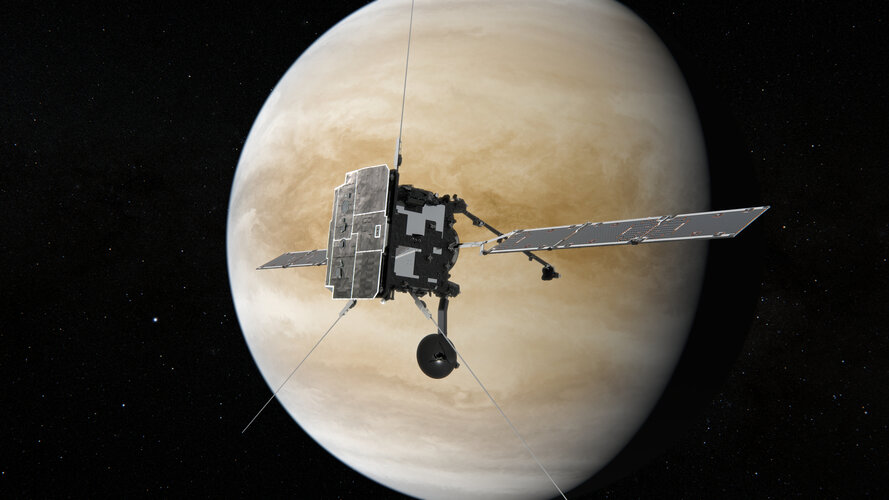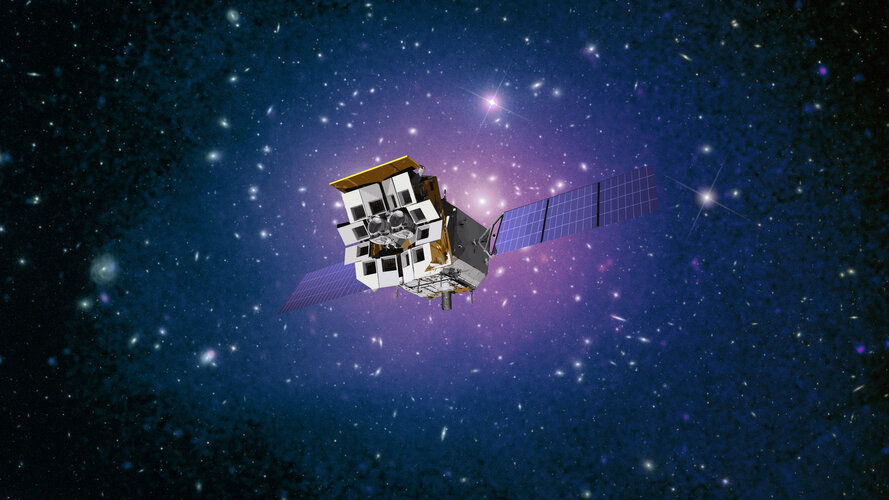
Copernical Team
The PI's Perspective: A New Mission Update for the New Year
 New Horizons is healthy and continuing to speed outward across the Kuiper Belt. Our spacecraft is 61 times as far from the Sun as Earth, or over 5.5 billion miles from home! Radio signals, traveling to and from New Horizons at the speed of light - about 186,000 miles per second - take about nine hours to cover that distance.
New Horizons is about halfway through a hibernation period that
New Horizons is healthy and continuing to speed outward across the Kuiper Belt. Our spacecraft is 61 times as far from the Sun as Earth, or over 5.5 billion miles from home! Radio signals, traveling to and from New Horizons at the speed of light - about 186,000 miles per second - take about nine hours to cover that distance.
New Horizons is about halfway through a hibernation period that Want some salt with that
 Asteroids that pass close to Earth often raise concerns about potential collisions, but they also present valuable opportunities for scientific discovery. One such celestial body, the 900-meter-wide asteroid Ryugu, has recently yielded intriguing evidence that may enhance our understanding of life's building blocks in the Solar System.
Scientists from Kyoto University have detected salt mi
Asteroids that pass close to Earth often raise concerns about potential collisions, but they also present valuable opportunities for scientific discovery. One such celestial body, the 900-meter-wide asteroid Ryugu, has recently yielded intriguing evidence that may enhance our understanding of life's building blocks in the Solar System.
Scientists from Kyoto University have detected salt mi Solar Orbiter ready for close encounter with Venus

The European Space Agency (ESA) is ready to guide the ESA/NASA Solar Orbiter spacecraft through its closest encounter with Venus so far.
Today’s flyby will be the first to significantly ‘tilt’ the spacecraft’s orbit and allow it to see the Sun’s polar regions, which cannot be seen from Earth.
Studying the Sun’s poles will improve our understanding of solar activity, space weather, and the Sun-Earth connection.
Einstein Probe catches X-ray odd couple

Lobster-eye satellite Einstein Probe captured the X-ray flash from a very elusive celestial pair. The discovery opens a new way to explore how massive stars interact and evolve, confirming the unique power of the mission to uncover fleeting X-ray sources in the sky.
The pierogi challenge
 Image:
The pierogi challenge
Image:
The pierogi challenge Jumping workouts could help astronauts on the moon and Mars
 Jumping workouts could help astronauts prevent the type of cartilage damage they are likely to endure during lengthy missions to Mars and the Moon, a new Johns Hopkins University study suggests.
The research adds to ongoing efforts by space agencies to protect astronauts against deconditioning/getting out of shape due to low gravity, a crucial aspect of their ability to perform spacewalks,
Jumping workouts could help astronauts prevent the type of cartilage damage they are likely to endure during lengthy missions to Mars and the Moon, a new Johns Hopkins University study suggests.
The research adds to ongoing efforts by space agencies to protect astronauts against deconditioning/getting out of shape due to low gravity, a crucial aspect of their ability to perform spacewalks, Chinese space firm showcases mobile-to-satellite communication tech
 Chinese space technology company GalaxySpace has successfully demonstrated mobile-to-satellite communication technology utilizing China's first low-Earth orbit broadband communication test constellation. The demonstration took place during a commercial space conference in Beijing on Wednesday.
At precisely 10:28 am, a satellite from the constellation passed over the conference venue, locat
Chinese space technology company GalaxySpace has successfully demonstrated mobile-to-satellite communication technology utilizing China's first low-Earth orbit broadband communication test constellation. The demonstration took place during a commercial space conference in Beijing on Wednesday.
At precisely 10:28 am, a satellite from the constellation passed over the conference venue, locat New research explores CubeSat swarms for spacecraft servicing and repair
 As space agencies and private companies design satellites and telescopes with repairability in mind, the need for efficient servicing trajectories becomes crucial. Researchers from the Department of Aerospace Engineering at The Grainger College of Engineering, University of Illinois Urbana-Champaign, have developed a new method enabling multiple CubeSats to coordinate in servicing and assembling
As space agencies and private companies design satellites and telescopes with repairability in mind, the need for efficient servicing trajectories becomes crucial. Researchers from the Department of Aerospace Engineering at The Grainger College of Engineering, University of Illinois Urbana-Champaign, have developed a new method enabling multiple CubeSats to coordinate in servicing and assembling K2 Space secures $110M Series B funding and achieves first in-space demonstration
 K2 Space has announced the successful completion of a $110 million Series B funding round aimed at scaling up production of its advanced, high-power satellite platform. The investment, co-led by Lightspeed Venture Partners and Altimeter Capital, also included participation from existing stakeholders such as Alpine Space Ventures and First Round Capital. This achievement coincides with the compan
K2 Space has announced the successful completion of a $110 million Series B funding round aimed at scaling up production of its advanced, high-power satellite platform. The investment, co-led by Lightspeed Venture Partners and Altimeter Capital, also included participation from existing stakeholders such as Alpine Space Ventures and First Round Capital. This achievement coincides with the compan Redwire Secures ESA Contract to Develop Next Dark Matter Mission Concept
 Redwire Corporation (NYSE: RDW), a leading provider of space infrastructure solutions, has been awarded a study contract by the European Space Agency (ESA) to develop an initial spacecraft design for a new astrophysics mission. This mission aims to capture images of faint galaxies in the nearby universe, shedding light on the elusive nature of dark matter.
Redwire's Belgian subsidiary, Red
Redwire Corporation (NYSE: RDW), a leading provider of space infrastructure solutions, has been awarded a study contract by the European Space Agency (ESA) to develop an initial spacecraft design for a new astrophysics mission. This mission aims to capture images of faint galaxies in the nearby universe, shedding light on the elusive nature of dark matter.
Redwire's Belgian subsidiary, Red 



































